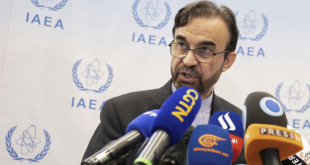 TEHRAN (FNA)- Iran and Germany signed a contract for construction of a petrochemical plant in Imam Khomeini Port in Iran’s Khuzestan province.
TEHRAN (FNA)- Iran and Germany signed a contract for construction of a petrochemical plant in Imam Khomeini Port in Iran’s Khuzestan province.
According to the deal between the National Iranian Petrochemical Company (NIPC) and Germany’s Uhde GmbH, the plant will have a production capacity of 350,000 tons of dehydrogenated propane.
The total value of the contract is 25 million euros and it will take 42 months to be completed.
Imam Khomeini Propane Dehydrogenation Plant will be fed by the propane produced by Imam Khomeini Petrochemical Complex, press tv reported.
A member of Uhde GmbH, Alfred Hoffmann, said that his company is currently implementing a similar project with the same annual output of 350,000 tons per year in Egypt.
NIPC Managing Director Adel Salimnejad said that NIPC has decided to produce the valuable propylene petrochemical substance in the most efficient manner by dehydrogenating propane found abundantly in gas extracts from the oil wells.
Iran, which sits on the world’s second largest reserves of both oil and gas, is facing US sanctions over its civilian nuclear program.
Iranian officials have dismissed US sanctions as inefficient, saying that they are finding Asian partners instead. Several Chinese and other Asian firms are negotiating or signing up to oil and gas deals.
Following US pressures on companies to stop business with Tehran, many western companies decided to do a balancing act. They tried to maintain their presence in Iran, which is rich in oil and gas, but not getting into big deals that could endanger their interests in the US.
Yet, after oil giants in the West witnessed that their absence in big deals has provided Chinese, Indian and Russian companies with excellent opportunities to signing up to an increasing number of energy projects and earn billions of dollars, many western firms are slowly losing reluctance to invest or expand work in Iran.
Some European countries have also recently voiced interest in investment in Iran’s energy sector after a gas deal was signed between Iran and Switzerland regardless of US sanctions.
The National Iranian Gas Export Company and Switzerland’s Elektrizitaetsgesellschaft Laufenburg signed a 25-year deal in March for the delivery of 5.5 billion cubic meters of gas per year.
The biggest recent deal, worth €100m ($147m, £80m), was signed by Steiner Prematechnik Gastec, the German engineering company, this month to build equipment for three gas conversion plants in Iran. This is at a time when France’s Total, Royal/Dutch Shell and Norway’s Statoil have put on hold their shares in multi-billion dollar contracts.
Washington and its Western allies accuse Iran of trying to develop nuclear weapons under the cover of a civilian nuclear program, while they have never presented any corroborative document to substantiate their allegations. Iran denies the charges and insists that its nuclear program is for peaceful purposes only.
Tehran stresses that the country has always pursued a civilian path to provide power to the growing number of Iranian population, whose fossil fuel would eventually run dry.
Despite the rules enshrined in the Non-Proliferation Treaty (NPT) entitling every member state, including Iran, to the right of uranium enrichment, Tehran is now under four rounds of UN Security Council sanctions for turning down West’s illegitimate calls to give up its right of uranium enrichment.
Tehran has dismissed West’s demands as politically tainted and illogical, stressing that sanctions and pressures merely consolidate Iranians’ national resolve to continue the path.
The UN sanctions address individuals and companies involved in nuclear- and arms-related activities without banning daily trade and non-nuclear investment.
But the US has imposed unilateral restrictions in particular on financial transactions and big investments.
Political observers believe that the United States has remained at loggerheads with Iran over the independent and home-grown nature of Tehran’s nuclear technology, which gives the Islamic Republic the potential to turn into a world power and a role model for other third-world countries. Washington has laid much pressure on Iran to make it give up the most sensitive and advanced part of the technology, which is uranium enrichment, a process used for producing nuclear fuel for power plants.
Washington’s push for additional UN penalties contradicts the report by 16 US intelligence bodies that endorsed the civilian nature of Iran’s programs. Following the US National Intelligence Estimate (NIE) and similar reports by the IAEA head – one in November and the other one in February – which praised Iran’s truthfulness about key aspects of its past nuclear activities and announced settlement of outstanding issues with Tehran, any effort to impose further sanctions on Iran seems to be completely irrational.
 Eurasia Press & News
Eurasia Press & News


